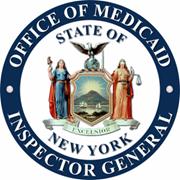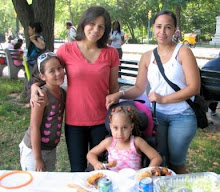Friday, July 29, 2011
Sinergia Participates in People First Waiver
The New York State Office for People With Developmental Disabilities (OPWDD), in consultation with the State Department of Health and other stakeholders, has begun to seek programmatic and fiscal reforms to the service system through the development of a new 1115 demonstration waiver, the “People First Waiver”. There have been Listening Forums and Public Hearings throughout the state to gather input from individuals, family members, providers and stakeholders on how to restructure the current system of care for individuals with developmental disabilities. A steering committee and five design teams have been established to make reform recommendations, and to help plan the roll out of the waiver and its implementation. Myrta Cuadra Lash, Executive Director of Sinergia, has been nominated to serve on the Benefits Design Team that is charged with “making service and supports reform recommendations that enhance person centered planning and service delivery and increase the system’s capacity to serve people in the most appropriate community setting with an equitable level of resources based on the needs assessment process.” She will contribute to this team’s discussion on specialty populations and the service needs that should be added for people/families who are underserved to successfully participate in the 1115 Waiver. The waiver will transform New York State’s total system of care for persons with developmental disabilities within the next five years. We encourage you to visit the OPWDD website to keep abreast of developments in the People First Waiver and find ongoing information from the design teams.
How Well Do You Know Your Child's School Staff?
Situations arise all the time at school and often you may be unsure of who to call -- should you speak to the principal or your child's counselor? By getting to know the staff at school you'll also be better prepared for IEP meetings. It's about understanding how the school operates, and knowing what role the different people play in supporting your child. Here's a list that will help you gather all the pertinent contacts you'll need. Keep it handy and update it as needed.
1. My child’s school principal name is ___________________________________________
2. The name of the assistant principal is_________________________________________
3. The school counselor name is _______________________________________________
4. My child’s Special Education teacher’s name is_________________________________
5. My child’s general education teacher’s name is_________________________________
6. What is the name of the school Psychologist___________________________________
7. The Parent Coordinator is__________________________________________________
8. The name of the school secretary is__________________________________________
9. I have the telephone numbers of each of the above Yes No
10. I know where they are located at the school? Yes No
(photo: www.school-portal.co.uk)
Making The Most of the Parent Teacher Conference
You and your child’s school have something in common: both of you want your child to learn and do well. Parent Teacher Conferences are an important component of the ongoing dialogue between families and schools, so when talking with your child’s teacher, remember that both of you have valuable information to share, and both of you can learn something new to help your child. The Parent Teacher Conference is a two-way conversation and good outcomes are achieved when both parents and teachers talk and listen. There should be an emphasis on learning and a focus on both how well the child is doing in school, as well as how your child can do better. Opportunities and challenges should also be discussed.
Parent Teacher Conferences typically occur before a child's first marking period, when they receive their report cards. That means the first one will happen just before Thanksgiving, but parents do not have to wait until then. They can ask teachers for a conference at any time. They can also make the request in writing, if they wish to document it.
Cassandra Archie, Co-Director of the Metropolitan Parent Center suggests that the first Parent Teacher Conference be scheduled at the end of September, and below are some questions that parents should ask teachers to understand if their child is starting out properly.
Talk to your child’s teacher about:
- Progress – how is your child doing. Is my child performing at grade level? What do you see as his/her strengths? How could he or she improve?
- Assignments and assessments. Ask to see examples of your child’s work. Ask how the teacher gives grades.
- Your thoughts about your child. Tell the teacher what your child is good at. Explain what your child needs.
- Support learning at home. Ask what you can do at home to support your child’s learning.
- Support learning at school. Ask how the teacher will both challenge and support your child when they need it.
- Make a plan - Write down the things you and your teacher will each do to support your child. Make plans to check in with the teacher in the coming months.
- Schedule another time talk – There are many ways to communicate, in-person, by phone, notes, email. Be sure to schedule a time to talk.
- Talk to your child. If appropriate talk with your child, don’t forget to include him or her.
For more info visit The Harvard Family Research Project – Parent Teacher Conferences: A Tip Sheet for Parents www.hfp.org
Does The School Fit My Child’s Needs?
According to Cassandra Archie, co-director of Sinergia's Metropolitan Parent Center, it's important for parents of children with special needs to think critically about whether the school fits with their child's needs. To that end, she compiled a checklist of questions to help them make an ongoing assessment. It can be used throughout the year, but she says parents should know and understand some of these items immediately, like in the first month -- for example, regarding philosophy and behavior issues.
Checklist
(photo: thedailygreen.com)
Checklist
- What is my child’s school philosophy?
- How is the school guided by that philosophy?
- How long has the principal been at my child’s school?
- Does the principal have any teaching experience?
- What training does a teacher receive for a particular class they are teaching?
- What types of opportunities are there for integration with non-disabled students?
- Are there any after-school programs offered? If yes, which ones?
- How does the school address behavior issues?
(photo: thedailygreen.com)
The New IEP Forms Are Here – Are You Ready?
On Sept. 1st during our Back to School Open House we will have a 20-minute session giving hands-on instruction on getting familiar with the new IEP system. Parents will be able to familiarize themselves with the new IEP forms, which were developed by the State to help IEP teams focus on the services that are most important and to reduce variation of forms across the state. Here's what you'll need to know:
For the first time all new IEP documents will be created and maintained electronically, using the Special Education Student Information System (SESIS), a secure web-based case management system for students with IEP’s.
The chart below compares the old IEP pages (Current IEP "Page") to the new IEP layouts/sections (SESIS "Section"). This is important for parents to know because the IEP meeting will be conducted using the SESIS sections, and most parents will have an old IEP form, which flows differently. For example, at an upcoming IEP meeting the first thing that will be discussed is the Summary Page, which is the same as the current IEP pages. But following that will be the Attendance Page, which would have been the Conference Information on the old IEP, and so on.
Old vs New:
For additional guidance related to the new IEP see:
Answers to Question About Changes on the IEP
New York State Education Department website
- The new IEP form is a statewide form that will be used by all school districts in New York State
- The new IEP forms are required for the upcoming school year 2011-2012
- The expectation – the IEP will be more individualized to each student
- Parents will remain vital members of the IEP team
For the first time all new IEP documents will be created and maintained electronically, using the Special Education Student Information System (SESIS), a secure web-based case management system for students with IEP’s.
The chart below compares the old IEP pages (Current IEP "Page") to the new IEP layouts/sections (SESIS "Section"). This is important for parents to know because the IEP meeting will be conducted using the SESIS sections, and most parents will have an old IEP form, which flows differently. For example, at an upcoming IEP meeting the first thing that will be discussed is the Summary Page, which is the same as the current IEP pages. But following that will be the Attendance Page, which would have been the Conference Information on the old IEP, and so on.
Old vs New:
For additional guidance related to the new IEP see:
Answers to Question About Changes on the IEP
New York State Education Department website
Wednesday, July 6, 2011
Sinergia's 2011 Summer Benefit
Beautiful setting, beautiful sounds, beautiful people! That's how we would describe our Summer Benefit on June 12th, where we had a chance to pause for a moment and take stock of our accomplishments. Everyone was looking their best and in a celebratory mood as the music of the Ray Santos Orchestra filled the space at the historical Museum of the City of New York.
The event gave us the opportunity to honor Dr. Pedro Noguera (above left), who is the Peter L. Agnew Professor of Education at New York University, for the work he does to champion children and promote student achievement. His immense scholarship and research on urban education prompted us to recognize him with the first ever Dr. Sally Romero Award for distinguished service to children, which was presented to him by Dr. Romero's daughter, Norma Romero-Mitchell.
We also honored New York State Assemblyman Robert J. Rodriguez (above right) with the Community Service Award for his tireless work in building the infrastructure that will ensure access to housing and business development, as well as cultural and social services in East Harlem. Yolanda Sanchez, an institution in the Latino community who has spent over thirty years in human services, presented him with the award. Both honorees also received a citation from the NY State Assembly.
The evening was dedicated to two of our very own heroines who are no longer with us. Dr. Sally Romero was President of Sinergia's Board of Directors until her untimely passing last summer. Christine Cuadra was a beautiful young woman who stood out in her vibrant red dress at our last gala in 2008. She too has passed on but we will never forget her dedication and hard work with the homeless families at Sinergia and her unwavering support to her mother, Executive Director Myrta Cuadra-Lash.
We were also thrilled to announce that June 12th was proclaimed Sinergia Day by the Council of the City of New York. The current President of Sinergia's Board of Directors, Dr. Len Torres (above), read the inscription, which says in part: "On behalf of all New Yorkers we commend Sinergia for its leadership, vision, faith in families and its abiding commitment to and advocacy for children and adults with disabilities." We want to thank the office of New York City Councilwoman Melissa Mark Viverito for arranging this proclamation. As we approach our 35th year, we will continue to build on our achievements.
The Ray Santos Orchestra (above) played a mix of Latin salsa and romantic boleros which had everyone congregating on the dance floor.

One of the items in the silent auction was a gorgeous oil painting (above) by artist Dianne Smith, former boardmember of Sinergia.
Dr. Gayle Haines (above left), who organized the silent auction, chats with Myrta Cuadra Lash and Beth Torres (above right).
Zenaida Mendez of the Manhattan Neighborhood Network (far left) and Dr. Marta Moreno Vega of the Caribbean Cultural Center African Diaspora (3rd, l. to r.) pose with the honorees.
The event gave us the opportunity to honor Dr. Pedro Noguera (above left), who is the Peter L. Agnew Professor of Education at New York University, for the work he does to champion children and promote student achievement. His immense scholarship and research on urban education prompted us to recognize him with the first ever Dr. Sally Romero Award for distinguished service to children, which was presented to him by Dr. Romero's daughter, Norma Romero-Mitchell.
We also honored New York State Assemblyman Robert J. Rodriguez (above right) with the Community Service Award for his tireless work in building the infrastructure that will ensure access to housing and business development, as well as cultural and social services in East Harlem. Yolanda Sanchez, an institution in the Latino community who has spent over thirty years in human services, presented him with the award. Both honorees also received a citation from the NY State Assembly.
The evening was dedicated to two of our very own heroines who are no longer with us. Dr. Sally Romero was President of Sinergia's Board of Directors until her untimely passing last summer. Christine Cuadra was a beautiful young woman who stood out in her vibrant red dress at our last gala in 2008. She too has passed on but we will never forget her dedication and hard work with the homeless families at Sinergia and her unwavering support to her mother, Executive Director Myrta Cuadra-Lash.
We were also thrilled to announce that June 12th was proclaimed Sinergia Day by the Council of the City of New York. The current President of Sinergia's Board of Directors, Dr. Len Torres (above), read the inscription, which says in part: "On behalf of all New Yorkers we commend Sinergia for its leadership, vision, faith in families and its abiding commitment to and advocacy for children and adults with disabilities." We want to thank the office of New York City Councilwoman Melissa Mark Viverito for arranging this proclamation. As we approach our 35th year, we will continue to build on our achievements.
The Ray Santos Orchestra (above) played a mix of Latin salsa and romantic boleros which had everyone congregating on the dance floor.

One of the items in the silent auction was a gorgeous oil painting (above) by artist Dianne Smith, former boardmember of Sinergia.
Dr. Gayle Haines (above left), who organized the silent auction, chats with Myrta Cuadra Lash and Beth Torres (above right).
Zenaida Mendez of the Manhattan Neighborhood Network (far left) and Dr. Marta Moreno Vega of the Caribbean Cultural Center African Diaspora (3rd, l. to r.) pose with the honorees.
Tuesday, July 5, 2011
Essential Services Restored as NYC Budget Passes
The City Council passed New York City's budget for Fiscal Year 2012 (July 1, 2011 - June 30, 2012). Overall, this budget preserves essential services, preventing teacher layoffs, restoring fire companies, day care slots, and library services. A few of the highlights are below, but please click here for more detailed information.
Restoring Essential Services
In his Executive Budget proposal in May, Mayor Bloomberg proposed a wide range of cuts that would have impacted essential services. The City Council worked with the Bloomberg Administration to restore many essential services:
Restoring Essential Services
In his Executive Budget proposal in May, Mayor Bloomberg proposed a wide range of cuts that would have impacted essential services. The City Council worked with the Bloomberg Administration to restore many essential services:
- No teacher layoffs, thanks to an agreement between the Council, the City, and the UFT.
- No fire company closures
- Substantial restorations to child care and thousands of “Priority 5” after-school vouchers for families, albeit at a lower funding level
- Neighborhood public libraries will continue to offer 5-day-a-week service
- Restorations to the Parks Department will mean public pools are open all summer, and we’ll still have playground associate
- The Council also restored many smaller, but still important, programs – like those that help immigrants learn English, prevent homelessness, and offer legal and social services.
OMIG Legislation Reform
As the economic downturn continues to make federal dollars to not-for-profit agencies serving people with disabilities more and more difficult to attain, federal offices are taking steps to reduce fraud and waste. The Office of the Medicaid Inspector General (OMIG) is the investigation and enforcement arm of Medicaid and is responsible for initiating audits and levying penalties when fraud is uncovered. However, many agencies, not for profit service providers and funding agencies like OPWDD consider OMIG audits to be excessively punitive and over-reaching in their zeal to recover or eliminate funds to said agencies. Advocates for reining in the OMIG have complained that agencies found to be guilty of even the minutest instances of mistaken billing have been too severely reprimanded through the imposing of heavy fines and penalties. While acts of blatant and purposeful fraud need to be uncovered and the guilty punished, the OMIG has been accused of being extremely heavy handed and punitive when meting out judgments for alleged mistakes in billing for reimbursements for delivered services. Additionally, allegations of abusive and dismissive treatment towards staff members, not allowing agencies to repair or correct minor and unintentional episodes of mistaken billing and incomplete explanations of alleged violations, have also been of grave concern to agencies under audit.
Legislation to provide due process protections for providers and recipients of Medicaid who come under the scrutiny of OMIG passed both houses of the Legislature in June. The long awaited measure, also known as OMIG reform, will provide for fair practices, procedures and standards for actions if signed by Governor Cuomo. We will be carefully monitoring this situation and will report any additional developments as they occur.
(Photo)
Legislation to provide due process protections for providers and recipients of Medicaid who come under the scrutiny of OMIG passed both houses of the Legislature in June. The long awaited measure, also known as OMIG reform, will provide for fair practices, procedures and standards for actions if signed by Governor Cuomo. We will be carefully monitoring this situation and will report any additional developments as they occur.
(Photo)
Special Lunch for DayHab Volunteers
Of the many activities that the adults in our Day Habilitation Program partake in, volunteering is one of the ones they enjoy the most. On June 23rd, DayHab volunteers were honored at a luncheon in the Dr. Nivia Zavala Conference Center. In appreciation for their assistance to such agencies as Meals On Wheels, each participant was presented with a framed certificate along with a gift certificate from Target. Also in attendance was Eve Cook, the Volunteer Coordinator for New York City Meals on Wheels, who stated during her speech that the volunteers from Sinergia were her most reliable and were known for showing up even during inclement weather. It means a great deal for these adults with disabilities to give back to the community through their delivery work for Meals on Wheels, and the horticultural assistance they give at the Rusk Institute and the Carver Gardens on 124th Street.
Sinergia's Family Care Providers Appreciation Luncheon
On July 22 Sinergia will host a Family Care Appreciation Luncheon, where we acknowledge the invaluable contributions of five dedicated Family Care providers. Our Family Care Program, which has been in operation for 20 years, consists of families living in the community who open their homes to people with developmental disabilities. Presently there are ten individuals living with families in the community. Some have lived in a family care home since infancy while others have lived with the same family for as long as twenty years. Two brothers who are now in their teens consider their family care provider their Mom since they joined the family when they were babies. The individuals with developmental disabilities living in family care homes become integral members of these families; they participate in all family activities and go on vacation with them. It also affords them the opportunity to partake in all aspects of community living. We salute the following Family Care Providers for their nurturance, love and dedicated care: Angela Baez, Guadalupe Guillen, Ana Guzman, Leydi Dominguez, Carmen Ulloa. Pictured above is last year's luncheon.
Subscribe to:
Posts (Atom)


























